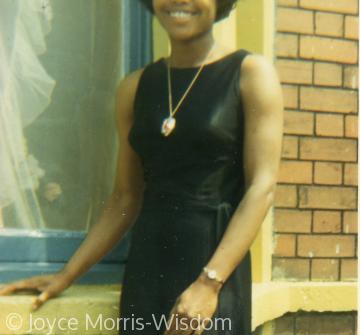Joyce Morris-Wisdom

The March, 1963
‘Prior to the march, which started from City Road to Broadmead, Paul requested permission from the School, which in turn requested permission from my Mother, to be absent from school that day in order to participate in the march. [I wanted] ... to be marked present for lessons ... [as I felt] my involvement ... would help me when I became older [as it] would enable me to have a better understanding of public ... protests and where possible even help me to take part in public speak[ing] ...I was obviously nervous but excited as well and felt valued that I was asked to participate in such a life-changing event. [I] did not hesitate to agree, as a matter of fact I felt really honoured. I left as if I was attending school as usual, we met and were briefed about what we should and should not do and emphasised that all activity would be peaceful.I remembered holding a plac[ard] ... to the effect “END RACISM ON THE BUSES” with a Police Officer mounted on a chestnut coloured horse situated on my right hand and Paul and the others on my left and in the middle. I felt frightened and intimidated even though the march was peaceful, because the crowd and on-lookers were hostile and I was unsure how and what the Police would [do] [or if they would] protect us if we were attacked. I even thought about that if we were attacked what would I do, run, stand still or take refuge with the elders. I had no idea what would be the best idea to do and what the result would be.We marched from City Road passed Dockland Settlement Club into Broadmead to The Bay Horse Pub. Although still overwhelmed by it all I felt proud and excited that I was able to do such a task, for myself and the community, and delighted that I held my nerves and took part in something so peaceful but changed the course of history for not only us as African Caribbeans but for our children and future non-white immigrants. My Mother and I talked about the outcome of the march as we did prior to the event and missing school. She praised me and again I felt honoured by her praise and Paul’s faith in me that I could handle the situation.When I went back to school nothing much [was] said about being absent … [or about] the march particularly from the Teachers. I was glad because I am not sure what I would have said, because the school system was not much different from the public’s perception of us as Black people from the Caribbean born under the English rule and not as slaves. I have from time to time told others including my children, grandchildren and young people whom I have worked with both commissioned and uncommissioned work as part of my role about the march. I even devised a crossword puzzle with the information in it including Rosa Parks, Martin Luther King and others, particularly Paul Stephenson’s role in improving employment prospects especially people wanting to work on the buses.My family and I are delighted that Paul has finally been honoured for all the hard work he has done for the community and here in the City and County of Bristol. I was fortunate to attend his Award for the Freedom of the City and County of Bristol as well as his OBE Celebratory Event [in 2009].Finally I believe there will be a photo of myself in the newspaper clippings of the march, although I am unable to find it … I have also seen a photo of a Black female in one of the March newspaper clippings but no other and … [there were] certainly more than 2 of us … females.’Joyce Morris Wisdom, who later trained in Youth Work under the guidance of Paul Stephenson, is currently studying Mandarin Chinese at the University of the West of England.
Content generated during research for the paperback book 'Bristol: Ethnic Monorities and the City 1000-2001' (ISBN 13 : 978-1-86077-477-5 ) for the England's Past for Everyone series


